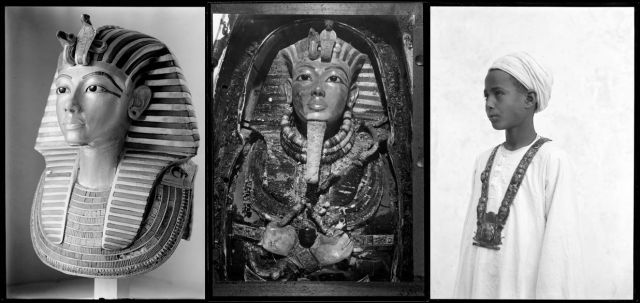Tutankhamun, Howard Carter and the Griffith Institute

Tutankhamun (c. 1341 BC – c. 1323 BC), was an ancient Egyptian pharaoh who ruled c. 1332 – 1323 BC during the late Eighteenth Dynasty of ancient Egypt.
Tutankhamun acceded to the throne around the age of nine following the short reigns of his predecessors Smenkhkare and Neferneferuaten. He married his half-sister Ankhesenpaaten, who was probably the mother of his two infant daughters. During his reign he restored the traditional polytheistic form of ancient Egyptian religion, undoing the religious shift known as Atenism.
The cult of the god Amun at Thebes was restored to prominence and the royal couple changed their names to "Tutankhamun" and "Ankhesenamun", replacing the -aten suffix. Additionally, he moved the royal court away from Akhenaten's capital, Amarna, and back to Memphis. He reestablished diplomatic relations with the Mitanni and carried out military campaigns in Nubia and the Near East. The young king likely began construction of a royal tomb in the Valley of the Kings and an accompanying mortuary temple but both were unfinished at the time of his death at the age of 18.
In this podcast, Dr Daniela Rosenow (Manager of the Griffith Institute), discusses the life of Tutankhamun and examines the story of Howard Carter and the excavation that led to the discovery of Tutankhamun's tomb. Dr Rosenow looks at the significance of the discovery, the international phenomenon it became, and reflects upon its legacy, and the colonialism of the period, which students of this history should keep in mind. A useful lecture, featuring Professor Richard Bruce Parkinson, that contextualises the discovery of the tomb in its historical, political, social and cultural setting, including addressing issues of colonialism and the British Empire can be found here.
Dr Rosenow also provides an introduction to the Griffith Institute, which contains the complete archive of the excavation, and talks about ways students and teachers can make use of their online archive.
1. Can you tell us about the Griffith Institute?
2. How significant was Tutankhamun in his own time?
3. Who were the top Egyptologists/archaeologists of the late 19th century/early 20th century
4. Who was Howard Carter?
5. Can you tell us about the discovery of Tutankhamun’s tomb?
6. Can you tell us about the moment he breached the final seal to the burial chamber?
7. What did Tutankhamun’s tomb contain that previous tombs had not? How significant a find was it?
8. To what extent did the discovery become an international phenomenon?
9. How might students and teachers of history use your online archive?
10. What should students keep in mind when engaging with this history? Legacy: stereotypes, colonialism and archaeology.
11. How has archaeology changed since the Carter’s excavation?
12. Can you talk to us about the curse?
13. What is the value of archaeological archives?
14. What was the Egyptian contribution to the excavation?
This resource is free to all registered basic users. Please Login or Join the HA.

